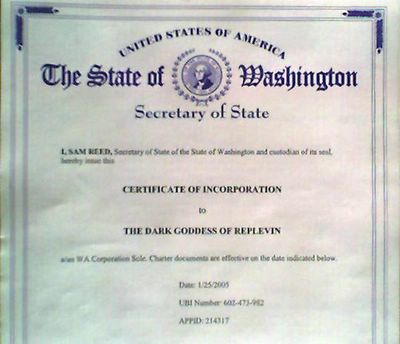As I post from time to time, I've been using practice management software for some time now. The brand I use comes in three basic flavors that I privately think of as Baby Bear, Mama Bear, and Papa Bear, or in more technical terms, Professional, Enterprise, and World Server. World Server in turn is broken down into Levels 1 through 4, with Level 4 providing " 1-2,000 concurrent users, may be Distributed or Non-Distributed, Fault-Tolerant Cluster [capital letters in original]." I don't even know what that very last bit means, but it sounds impressive, like this one goes to 11 or something. Aside from costing $19,500 for Level 4. Eek. Because I don't have much use for remote access right now, which seems to be the biggest appeal of World Server, I don't think I need that powerful (and expensive) a version right now. At this point I am trundling along using the Baby Bear entry level software.
One of the consultants in the moderated forum about the software that the manufacturer sponsors recently posted the following explanation of the difference between the Professional and Enterprise versions:
Now. I have little knowledge of the finer points of database engine selection, management, and maintenance. Since I am in effect my own IT person, my lack of knowledge troubles me when I read stuff like this from someone who seems to know more than I do."Time Matters Professional uses a database engine called Topspeed. This is what I refer to as a 'Desktop Database Solution' since all of the processing actually occurs on your desktop and NOT on the server. In other words, to your server, the Time Matters database is just like any other file on its system. Your application (Time Matters) requests data from the database and the server sends you ALL of the data and then sorts it on your desktop.
The Enterprise version of Time Matters runs with a SQL database. What this means is that there is an "engine" running on your server which performs all of the sorting of the data on the server and then sends your application (Time Matters) only enough information to fill the screen. (Okay, techies, this is not entirely accurate but the analogy works.)
So, Enterprise is MUCH more efficient, not because of Time Matters but, instead, because of the realities of database applications."
A quick surf around the Net led me to The TopSpeed Legend, which has an ominous sound to me somehow. It was also alarming that I couldn't find much else on TopSpeed anywhere. I hadn't heard of it before I started doing this research (not, admittedly, that this means all that much).
If I am reading between the lines properly here, if the "TopSpeed line of compilers * * * proved superior to all other compiler technology" in 1989, isn't that a heckuva long time ago for one's technology to have been superior? Why is it that, when I read reviews of different practice management software, no one ever talks about the reliability of the database engines on which they are built? Is this something I should be worried about?
Well, if I'm worrying, I suppose I could worry about the fact that my WinXP machine is based on a DOS foundation, and it's been so long since I've had XCOPY I forget who gets tied up.
But I digress. If I switch to the Enterprise version of my software, I get a SQL database. But is that a good thing, or not? I mean, I first heard of this database because of its association with a famous worm.
I'm afraid that my frustration with databases is a bit like my long-standing frustration with cars. When I rode a bicycle, it was clear how it worked. The force of my feet on the pedals made the wheels go round. My car is like a black box. I turn the key and off it goes. Or doesn't, but the reasons are never clear in either case.
When I had a manual typewriter, it was also clear how it worked. The force of my fingers on the keys made the keys hit the paper. Now, my computer, and my database that is a repository of my knowledge for at least the last seven years, is a similar black box.
That really bothers me because, when you come right down to it, my database as it is currently cross-referenced is the most potent distillation imaginable of those seven years of experience. The more time I spend exploiting the power of this database, the more value it has to me. I would hate to have to reconstruct it. And at some level, perhaps having to do with the infamous Flash Upgrading BIOS Incident of July 2000, I am truly afraid that my box will go irretrievably dark and take all my data with it.
Yeah, I've got a jump drive (512 MB) on my keychain, and I carry my database backups in my purse at all times (Monday through Friday, five separate backups in fact). I'm going to add a universal document backup when the price of the 1 GB jump drives comes down a bit more. But I can't shake that lurking fear that, at heart, is the native's fear of the magical search function of the database brought by the conquistador. My reptilian brain takes over. I'm hopeless.

No comments:
Post a Comment